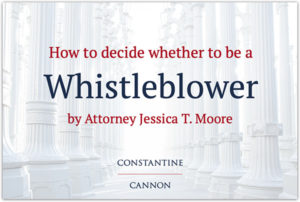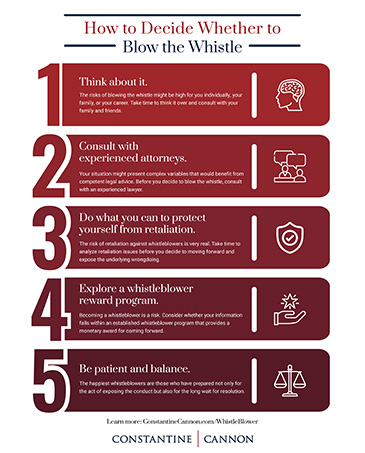How to Be a Whistleblower

You know about fraud, waste, abuse, or corruption by an individual or a company. Someone is getting by with cheating — taking money from the government, taxpayers, or investors, or even harming others, such as patients. You are deeply troubled about it and want the proper authorities to stop it. You are worried whether you will be heard, taken seriously, and protected. You wonder if your information fits within a whistleblower program that may compensate you for exposing the fraud.
In its most general sense, a whistleblower is someone who makes themselves heard above the noise and draws attention to wrongdoing. In the case of a referee in sports, blowing the whistle stops the action, exposes the misbehavior, and metes out punishment. But you do not enjoy the profession of referee. You don’t expose corporate wrongdoing for a living, aren’t familiar with the process, and might take on serious risk.
How do you decide whether to be a whistleblower?
TIP 1: HOW TO BE A WHISTLEBLOWER
-
-
Think about it.
You may feel that you want nothing more than to expose the bad behavior and hold the wrongdoers responsible. This is a good instinct – unsafe behavior, unfairness, inequity, and non-level playing fields are damaging to society and business.
But, the risks of blowing the whistle might be high for you individually, your family, or your career. There are many considerations. Some find it helpful at this point to talk confidentially with an attorney, spouse, and/or religious or professional counselor.
After consideration, you might ultimately conclude that blowing the whistle is too risky for you. You would not be alone in doing so. Only you can decide.
-
TIP 2: HOW TO BE A WHISTLEBLOWER
-
-
Consult with experienced attorneys.
Your situation might present complex variables that would benefit from competent legal advice. An experienced whistleblower attorney can advise you on the use of internal reporting (for example, a company hotline), external reporting (government hotlines), exposing the conduct to the proper authorities, safeguarding key evidence, approaching your employer, and reporting under an appropriate whistleblower program(s) that could provide you with some reward for your efforts. Finding counsel that is the right fit for you is key.
-
TIP 3: HOW TO BE A WHISTLEBLOWER
-
-
Do what you can to protect yourself from retaliation.
You, like many others, might be most worried about protection from personal retaliation for blowing the whistle. The risk of retaliation against whistleblowers is very real. Many federal and state whistleblower laws have anti-retaliation provisions intended to protect whistleblowers from being fired or demoted or in any way discriminated against in the terms or conditions of their employment in retaliation for bringing a whistleblower claim. Some potential whistleblowers want to analyze retaliation issues first before moving forward to expose the underlying wrongdoing. Experienced whistleblower attorneys can discuss your risks and options with you.
-
TIP 4: HOW TO BE A WHISTLEBLOWER
-
Explore a whistleblower reward program.
As you become comfortable about retaliation risks, you will want to consider whether your information falls within an established whistleblower program that provides a monetary award for coming forward. While experienced whistleblower attorneys can help you with this analysis, you can start by asking yourself the following:
-
-
- Does the fraud cheat the federal or state government out of money (for example, Medicare fraud, contracting fraud, defense fraud)? If so, you might have a False Claims Act or Qui Tam case which might result in a share of the award to the whistleblower.
- Is the company doing something that cheats or misleads investors and violates securities laws? If so, you might be able to make a submission under the SEC or CFTC whistleblower programs, which makes payments to some whistleblowers.
- Is a company or wealthy person cheating on taxes? You might be able to submit a whistleblower tip to the IRS and receive an award.
- If you are an employee or contractor of a motor-vehicle manufacturer, parts or equipment supplier, or dealership with information about a safety-related defect, you might qualify under the Motor Vehicle Safety Whistleblower Act.
- Does the fraud cheat private insurance programs? Some states have reward programs for whistleblowers who expose non-government-program insurance fraud. (Fraud on government health-care insurance programs falls within the False Claims Act, discussed above).
- If you don’t know whether your information fits any program, whistleblower counsel should be able to advise you as to whether your situation fits any of the above programs or qualifies under a number of other whistleblower reward programs.
-
TIP 5: HOW TO BE A WHISTLEBLOWER
-
Be patient and balance.
Being a whistleblower can take many years, and the rules of some programs restrict you from talking about it. Your time and involvement in your matter may come in fits and starts, or simply go dormant for long periods of time while the government processes the matter. The happiest whistleblowers are those who have prepared not only for the act of exposing the conduct but also for the long wait for resolution. They balance their role and obligations as a whistleblower with the other important aspects of life: family, community, career. Such whistleblowers also know that they cannot control the case or the outcome. Instead, they take satisfaction in being heard effectively and having their information investigated thoroughly, no matter the outcome. For specific experiences, read the story of a whistleblower client and our whistleblower spotlight and interviews.
The process of deciding to a be whistleblower and seeing it through is unique to every individual. There are personal, professional, financial, philosophical, and other dimensions. If you make the decision to blow the whistle, plan and prepare for the events that will follow with guidance from trusted others such as experienced counsel.
Contact Constantine Cannon today for a confidential consultation. Learn more about being a whistleblower:
- I Think I Have a Whistleblower Case?
- Whistleblower FAQs
- Common Types of Whistleblower Cases
- Browse the Whistleblower Insider Blog
- Get a Case Review from a Whistleblower Attorney
Tagged in: Auto Safety, CFTC Whistleblower Reward Program, Employment Issues, FCA Federal, FCA State, Importance of Whistleblowers, Private Insurance Whistleblower Reward Programs, Retaliation, SEC Whistleblower Reward Program, Whistleblower Answers, Whistleblower Protection Laws, Whistleblower Rewards,
